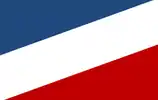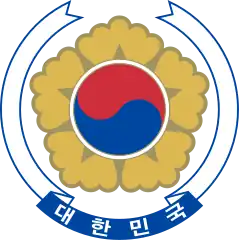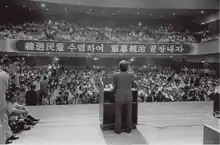New Korean Democratic Party
The New Korean Democratic Party (Korean: 신한민주당; Hanja: 新韓民主黨; RR: Sinhanminjudang, NKDP) was an opposition political party of South Korea from 1984 to 1988. It was the largest opposition party in South Korea until Kim Dae-jung and Kim Young-sam left to form the Reunification Democratic Party.
New Korean Democratic Party 신한민주당 新韓民主黨 | |
|---|---|
| Abbreviation | NKDP |
| Founded | 17 December 1984 |
| Legalised | 18 January 1985 |
| Dissolved | 28 April 1988 |
| Merger of | People's Democratic[lower-alpha 1] |
| Ideology | Liberalism (South Korean) |
| Political position | Centre to centre-right |
| Colours | Scarlet |
| Party flag | |
 | |
| Part of a series on |
| Liberalism in South Korea |
|---|
 |
History
Formation
The party was formed by the notable figures of New Democratic Party (NDP) and Council for the Promotion of Democracy (CPD).
Most of NDP politicians including Kim Young-sam and Kim Dae-jung were banned by Hanahoe (Group of One) of Chun Doo-hwan in 1980. There were 2 opposition parties formed at this time ― Democratic Korea Party (DKP) and National Party of Korea (Nat'l).[1] Nevertheless, both were often regarded as satellite parties of the ruling Democratic Justice Party.[1]
Many of the former NDP and CPD members formed New Korean Democratic Party, in a purpose of the "real opposition", after their political bans were lifted in December 1984.[2] Originally, they intended to re-establish the NDP,[3] but impossible because the name "NDP" was prohibited.[2] Instead, they opted "New Korean Democratic Party" that can be abbreviated as "New Democratic Party (NDP)".
The party was officially founded on 18 January 1985,[4][5] and elected Lee Min-woo as the Chairman.[4]
1985 election and aftermath

The party, however, faced the general election on 12 February,[6] shortly after the formation. Due to the short preparation time along with the government's election fraud, the party was expected to be defeated.[2] The Agency for National Security Planning analysed that NKDP would barely win around 20 seats, and in addition, Chairman Lee running for Jongro & Central District of Seoul, would be lost in the constituency.[2]
Nevertheless, the party shockingly won in the election, receiving 29.3% and won 67 out of 276 seats, made it as the main opposition in the National Assembly.[7][2] Furthermore, Lee, who received 31.63%, also won in his constituency.[7]
Their seats were later increased up to 103, after some MPs from DKP and Nat'l defected to NKDP,[8][9][10][11][12][2] which occurred serious conflicts between the government and the opposition. This, however, also boosted the government's repression that reached its zenith when the party's MP Yoo Sung-hwan was arrested after his parliamentary speech on 14 October 1986.[13][2]
Decline and dissolution
The party faced an internal conflict after Lee announced his own plan, named "Lee Min-woo Plan", which supported parliamentary system.[14] This was strongly objected by Kim Young-sam (YS) and Kim Dae-jung (DJ), who advocated to maintain the incumbent presidential system but sought for direct election of the President.[14] Finally, both pro-YS and pro-DJ factions broke the party out and founded United Democratic Party (UDP) on 21 April 1987.[15]
Since 74 MPs defected to UDP, the seats were plummeted up to 26. Although the minor People's Democratic Party merged itself with NKDP in April 1987, the party never revived, and didn't even put a candidate for upcoming presidential election. Lee also resigned his chairmanship and retired from the politics on 6 November.[16]
On 15 January 1988, the acting Shin Do-hwan was officially elected as the new Chairman.[17] However, the party lost all seats in 1988 election, and was subsequently deregistered on 28 April.[18][19]
Leadership
Chairmen
| No. | President(s) | Period |
|---|---|---|
| 1 | Lee Min-woo | 18 January 1985 – 6 November 1987 |
| Lee Taek-hui (interim) | 27 November 1987 – 5 January 1988 | |
| 2 | Shin Do-hwan | 15 January 1988[lower-alpha 2] – 26 April 1988 |
Election results
| Election | Leader | Votes | % | Seats | Position | Status | |||
|---|---|---|---|---|---|---|---|---|---|
| Constituency | Party list | Total | +/– | ||||||
| 1985 | Lee Min-woo | 5,843,827 | 29.26 | 50 / 184 |
17 / 92 |
67 / 276 |
new | 2nd | Opposition |
| 1988 | Shin Do-hwan | 46,877 | 0.24 | 0 / 224 |
0 / 75 |
0 / 299 |
8th | Extra-parliamentary | |
Notes
- 4 April, 1987
- acting from 5 to 15 January
References
- 한국 현대사 산책 1980년대편 2 : 광주학살과 서울올림픽 by Kang Joon-man (12 May 2003)
- 날치기 국회사 by Kim Ye-chan (10 April 2016)
- "민추협과 2 • 12 총선". 11 December 2018.
- "신한민주당 창당". 18 January 1985. Retrieved 11 September 2019.
- "신한민주당의 나갈 길". 19 January 1985. Retrieved 11 September 2019.
- "총선 2월12일 각의의결 확정". 19 January 1985. Retrieved 11 September 2019.
- "신민 대도시압승 제1야당". 13 February 1985. Retrieved 11 September 2019.
- "민한의원 21명 신민입당". 3 April 1985. Retrieved 11 September 2019.
- "조병봉·김완태의원 국민탈당 신민입당". 4 April 1985. Retrieved 11 September 2019.
- "박일씨 신민입당". 9 April 1985. Retrieved 11 September 2019.
- "이태구의원 신민입당". 9 May 1985. Retrieved 11 September 2019.
- "전의원12명 민한탈당 조윤형씨등 신민입당". 24 July 1985. Retrieved 11 September 2019.
- "유성환 신민의원 구속영장". 15 October 1986. Retrieved 11 September 2019.
- "「이민우구상」 신민 계속진통". 7 January 1987. Retrieved 11 September 2019.
- "가칭 통일민주당, 신당 창당 진통[하금렬]". 21 April 1987. Retrieved 11 September 2019.
- "이민호(신민당 총재) 정계 은퇴 선언". 6 November 1987. Retrieved 11 September 2019.
- "총재 신도환씨 선출 신민 임시전당대회". 15 January 1988. Retrieved 11 September 2019.
- "총선서 의석못낸 9개당 등록취소". 28 April 1988. Retrieved 11 September 2019.
- Park Kwang-on (28 April 1988). "중앙선거관리위원회, 의석 못 낸 9개 정당 등록 취소 결정[박광온]". Retrieved 11 September 2019.